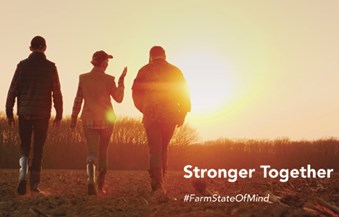
The American Farm Bureau offers mental health resources for farmers and ranchers on its Farm State of Mind website at www.fb.org/land/fsom.
December 30, 2020 - By Sara Neagu-Reed - I remember the exact moment I knew things were beginning to spiral.
I had everything one would want to feel fulfilled and happy: a wonderful family life, a job I loved and no real stressors weighing me down. Why did I feel the way I did?
This feeling began to take over, like a dark cloud following me, pouring down negative thoughts that I tried to suppress on my own. But I couldn't do it any longer.
I called my primary care physician, who helped me come to terms with my situation. Five years ago, I was diagnosed with clinical depression.
Growing up, I was taught not to show weakness. When questioned, my default response was "I'm doing great, thanks." The mantra of "the only sort of pain we feel is physical" continued throughout my life, neglecting the fact that emotional and mental pain is almost worse to deal with.
I am opening up today, so those of you reading this can feel comfortable to do the same.
Mental health in rural America should be a focal point, not a secondary issue. The California Farm Bureau recognizes that, and we held a breakout session on the topic at our virtual Annual Meeting.
The panel included two producers, one from Walnut Grove and one from Illinois, who shared their personal experiences with farm-related stress and how they have found ways to combat it. We were also joined by an American Farm Bureau communications specialist, who discussed efforts including the Farm State of Mind campaign that has helped elevate the issue at the national level.
From a policy angle, Congress should provide more funding and resources to rural communities, as well as to telehealth. More than 60% of rural Americans live in areas where there are few if any mental health professionals, and more than 90% of psychologists and psychiatrists work in metropolitan areas. From those statistics, it becomes clear that rural residents need better access to telehealth resources.
We saw some progress on our mental health policy requests recently, with the passage of a Farm Bureau-supported measure, the Seeding Rural Resilience Act, intended to help farmers and ranchers respond to stress and decrease the stigma associated with mental health care in rural communities.
The Seeding Rural Resilience Act would create three initiatives to promote mental health awareness and wellness in rural America:
• A farmer-facing training program that requires the U.S. Department of Agriculture to provide voluntary stress management training to employees of its Farm Service Agency, Risk Management Agency and Natural Resources Conservation Service.
• A $3 million campaign from the Department of Health and Human Services and USDA to increase public awareness of farm and ranch stress, and destigmatize mental health care in rural communities.
• Collaboration among state, local and nongovernmental stakeholders, led by the secretary of agriculture, to determine best practices for responding to farm and ranch mental stress.
It's crucial to expedite this sort of assistance, but addressing the issue requires a two-pronged approach. We may have the programs set up to assist farmers and ranchers, but without removing the stigma associated with mental health, many may not be willing to utilize such resources. That is why we need to continue talking about this together, normalizing the conversation and making the direct linkage between physical and mental health.
From my own experience, it's tough to come forward and say something about one's own mental health. The panelists in our mental health session couldn't agree more, and offered helpful advice:
- If you feel burdened by stress and need help, talk with someone.
- If you're not comfortable talking with your friends or family, call a health provider—they'll find a way to help you.
- Look up resources online; you can find many resources on the Farm State of Mind website at www.fb.org/land/fsom.
Know that you are not alone and if you know someone who may be struggling, don't wait for them to ask for help. Reach out and let them know you want to listen.
According to the Centers for Disease Control and Prevention, suicides among farmers are one and a half times higher than the national average. These suicide rates send a very clear message: We need to talk more about mental health. We need to prioritize farmers' and ranchers' personal needs as much as our overarching policy requests.
We at Farm Bureau are committed to do just that. We will continue fighting for issues affecting your farming operation—which includes your mental health.
(Sara Neagu-Reed is associate director of federal policy for the California Farm Bureau.)
Reprinted with permission: California Farm Bureau Federation








